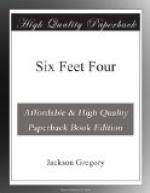He swept up the gold and silver and slipped it into his pocket, his hand going very close to his gun during the process but never hesitating. Then he got to his feet.
“Let’s go outside,” he said, turning toward Thornton.
He led the way, swinging about so that the broad of his back was to the man who followed him and the man whom he had sworn to kill. Walking so, a few paces between them, they passed by the bar, through the clutter of men about the door and out upon the narrow sidewalk. Still the Kid did not stop. He strode on, not so much as looking to see if he were followed, until he came to the middle of the narrow street. Then he came to a quick halt and turned.
“Now,” said the Kid, “spit it out. If you want to finish what we begun at Smith’s start in. I’m ready.”
“I told you,” Thornton answered him, “that I am not looking for trouble. When I am I know where I can find it.” He dropped his voice yet lower so that by no possibility could any one of the men upon the sidewalk hear him, and ended, “Jimmie Clayton sent me.”
“An’,” asked the Kid coolly, “who the hell is Jimmie Clayton?”
“He’s a poor little devil who is in need of a friend, if he’s got any,” Thornton returned. “And he said you were the only friend he had here.”
“Maybe I am an’ maybe I ain’t.” The sharpness of suspicion was still high in Bedloe’s eyes. “What about him?”
“You knew he was in the pen?”
“I ain’t answerin’ questions. Go ahead.”
“He broke jail a few days ago. He killed his guard and got himself pretty badly shot up. I guess they’re on his trail now. And he’s going to swing for it if they ever get him.”
“Where is he?” asked Bedloe sharply with no lessening of the suspicion and ready watchfulness.
“In the old dugout at the Poison Hole.”
“How’s it happen you know so much about it?”
“Jimmie was a friend to me once when I needed a friend. He got this far, he held out to ride to my cabin night before last and left a note. I took him out some grub last night. It’s all I can do for him; I haven’t any way to hide him out. And he’s in too bad shape to ride.”
“Well, where do I come in?”
Thornton shrugged his shoulders.
“That’s your business, yours and Jimmie’s. He said that you were a pal of his, and,” he added bluntly, with a keen curious look into the Kid’s steel-blue eyes, “that you never went back on a pal.”
Behind him in the street Thornton heard the clatter of horses’ hoofs coming on rapidly. He paid no attention until they were close to him, so close that from the corner of his eye he caught the flutter of a woman’s skirt. Then he knew who it was before she passed on. One was Pollard looking white and sick; the other, rosy cheeked and bright eyed, was Winifred Waverly.
A quick smile drove the sternness from his eyes and he swept off his hat to her, ignoring the presence of Pollard. But into her expression as she returned his look for the moment in which she was flashing by, there came no vague hint of recognition. He turned back to Bedloe, a little flush of anger in his cheeks. The two men were very near only battle just then. For the Kid smiled.




